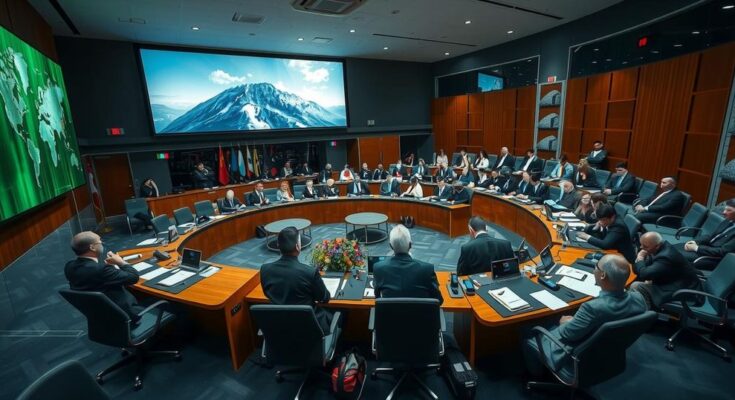The article analyzes the implications of Cop29 on climate finance, drawing parallels from Ecuador’s environmental struggles under Rafael Correa. It emphasizes the urgent need for international support to transition from fossil fuels, particularly in nations like Colombia. The discussions point to potential future coalitions that may help secure necessary funding for climate initiatives ahead of the next climate summit in Belém.
The discourse surrounding the recent Cop29 conference in Baku underscores the precarious balance between climate commitments and financial viability. The historical context provided through the actions of leaders such as Rafael Correa of Ecuador illustrates both the potential and challenges nations face in seeking financial support to curb fossil fuel dependency. Correa’s initiative to leave oil beneath the Yasuni National Park represents a poignant example of the struggle between environmental aspirations and economic imperatives.
The urgency of climate finance cannot be overstated. The retrospective look at Ecuador’s missed opportunities for financial backing to protect its biodiversity encourages reflection on current situations in nations such as Colombia, where new leadership advocates for significant funding to transition away from fossil fuels. With progressive leaders like Gustavo Petro attempting to appeal for international economic support, the fate of effective climate action hangs in the balance, particularly as elections loom in both Brazil and Colombia.
The aim to extend climate finance discussions post-Cop29 may seem ambitious, yet it embodies a critical hope for future commitments. Brazil’s role in potentially securing grants and loans reflects a broader strategy of international cooperation, which is vital for developing nations to achieve sustainable changes. Moreover, factors such as shifts in political landscapes across global major economies may create new pathways for support that can invigorate climate commitments moving forward.
While past failures at climate negotiations linger, a renewed focus on collaborative strategies among emerging economies could alter the narrative toward progress. However, as developed countries face their own fiscal challenges, the shared responsibility to counter fossil fuel influence on policy must be embraced collectively. The road to Belém presents a crucial opportunity, and stakeholders must remain steadfast in their endeavors to secure meaningful financing for climate initiatives.
The document discusses the outcomes of Cop29 held in Baku, examining the continued challenges facing climate change negotiations particularly regarding financial support for developing nations. It draws upon historical instances such as Ecuador’s Yasuni initiative under Rafael Correa to illustrate the risks of failing to secure necessary funding for ecological initiatives. The article highlights the parallel struggles of countries like Colombia, under President Gustavo Petro, as they seek substantial international backing to transition away from fossil fuels. As leaders internationally seek more effective means to bolster climate finance, the context of political elections and shifts within major economies is discussed as potentially significant for future climate actions.
In summary, while Cop29 may have presented setbacks in climate commitments, ongoing dialogues and prospective financial strategies could pave the way towards improved support for climate action in developing nations. The willingness of emerging leaders to advocate for transformative policies is key, yet their success will depend on international collaboration and adaptability amidst fluctuating political and economic contexts. The anticipated roadmap from Baku to Belém remains a pivotal opportunity to reignite global climate finance discourse.
Original Source: www.independent.co.uk




